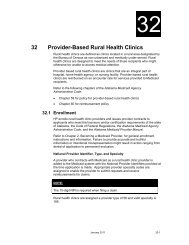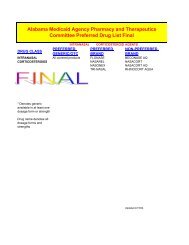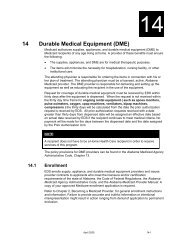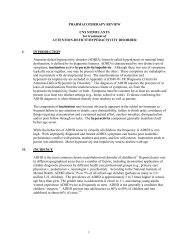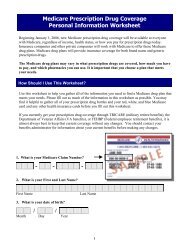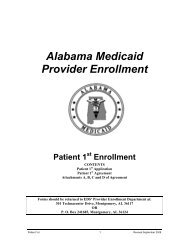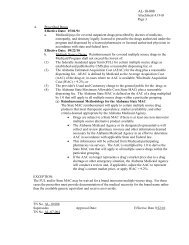Appendix A Well Child Check-Up (EPSDT)
Appendix A Well Child Check-Up (EPSDT)
Appendix A Well Child Check-Up (EPSDT)
Create successful ePaper yourself
Turn your PDF publications into a flip-book with our unique Google optimized e-Paper software.
<strong>Well</strong> <strong>Child</strong> <strong>Check</strong>-<strong>Up</strong><br />
Intensive Developmental Diagnostic Assessment<br />
An <strong>EPSDT</strong> Intensive Developmental Diagnostic Assessment is a multidisciplinary<br />
comprehensive screening limited to infants’ age zero to under two years, and is<br />
also limited to two per recipient per lifetime. These screenings are in addition to<br />
the routine periodic screenings and must be performed by a qualified <strong>EPSDT</strong><br />
Intensive Developmental Diagnostic Assessment Screening provider, as<br />
approved and enrolled by Medicaid.<br />
NOTE:<br />
Medical necessity is subject to retrospective review by the Alabama<br />
Medicaid Agency. Please refer to Chapter 7, Understanding Your Rights<br />
and Responsibilities as a Provider, for more information.<br />
Interagency Coordination<br />
The State of Alabama, in conjunction with the Interagency Coordinating Council<br />
and the Alabama Department of Rehabilitation Services will implement a system<br />
of services to the eligible population (20 USC Section 1471 et seq, Part H), with<br />
the assistance of agencies, programs, providers, and the families of eligible<br />
infants and toddlers with special needs.<br />
The Alabama Medicaid Agency is one of nine state agencies that hold positions<br />
on the Interagency Coordinating Council. The Early Intervention Law legislates a<br />
statewide system of early intervention services for eligible infants and toddlers<br />
that is comprehensive and coordinated among all disciplines and providers<br />
involved, and encourages the development of a system of service delivery that<br />
includes parents’ participation and input. Services that provide early intervention<br />
are to be coordinated across agency and provider lines.<br />
The definition of a child eligible for early intervention includes infants and toddlers<br />
under age three inclusive, who are either (1) experiencing developmental delay<br />
equal to or greater than 25 percent as measure by appropriate diagnostic<br />
instruments and procedures in one or more of the following areas: cognitive<br />
development, physical development (including vision and hearing),<br />
communication development, social or emotional development, adaptive<br />
development; or (2) they have a diagnosed physical or mental condition which<br />
has a high probability of resulting n developmental delay are eligible for early<br />
intervention services. Early intervention services can include the following:<br />
Audiology<br />
Family training/counseling & home visits<br />
Health<br />
Medical services for diagnostic/evaluation<br />
Nutrition<br />
Psychological services<br />
Special instruction<br />
Service coordination<br />
Occupational therapy<br />
Nursing<br />
Vision services<br />
Physical therapy<br />
Social work<br />
Speech/language pathology<br />
A-26 January 2011



